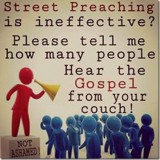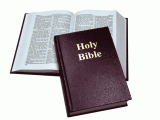We can truly know the correct day of the nativity of the God-man our Lord Jesus Christ, if Christians who hold to Sola Scriptura and who live by every Word of God will only read and trust the Scriptures as they say they always do.
Those who say they celebrate the birth of our Lord Jesus Christ on December 25 each year should go back and examine, study and search out the Scriptures that speak of our Lord Jesus Christ. Those who exegete the Scriptures and know much historical accounts of the Word of God, choose to reject the historical evidence presented in God’s Word. To say God reveals every other detail of His story, but remains silent on the incarnation – the birth – of His only begotten Son is to be downright naive. The only possible reason that this might be the mindset of many Christians is that they do not wish to surrender their desire for the heathen day with all its pagan traditions. Too many people – family, friends, children and grandchildren are going to be affected by this change in their life. If there is no change, is this not going to be a compromising of the Word of God?
What we should realise is that daily Christians should be thankful for God coming to this world in the Person of His Son in order to redeem sinners to Himself. I do not think that any Christian denies the birth of our Saviour. It is just a matter of understanding when our Saviour was born into this world. In order to find out we should understand that our Lord Jesus Christ was born into this world still under the Jewish Levitical system and every detail revealed in Luke chapters 1 and 2 are of pertinent importance. Every Word is God breathed and has a real reason why God has revealed it in Scripture for our instruction and teaching and His clear revelation.
At any given time, we have at some time dealt with and made the complex calculations of the Daniel prophecy dealing with the 70th Week, without any problems it would seem, but when it comes to making the calculations surrounding the birth of our Saviour, Christians who are “Daniel experts” have found it a problem to tie up the information given to us to calculate the time of Christ’s birth, even saying we cannot be sure of His birth, but yet how can you then be sure of the complex Daniel prophecy? Is it not a choice to want to speak with authority on the Daniel prophecy, but neglect the birth of the Saviour out of a choice to be wilful ignorant holding to the “Christmas” tradition of man? Whilst some might look into dictionaries to find the meaning of “Christmas” or the “mas” portion of the word, we should in fact look to the very Word of God, examining the law and prophets, the historical events and the translations from the original Hebrew and Greek autographs, if possible. This will reveal the Truth; but we have the added benefit of Bible helps by being able to look into lexicons and concordances without being experts in the Hebrew and Greek tongues.
The Gospel of Luke is the foundation from where we can start our study leading to the calculation of when our Lord Jesus Christ was born. To start from the course of Abia (Abijah) cross referencing the Holy Scriptures to see that it was the eighth course according to 1 Chronicles 24:10 and that the Hebrew calendar was a 360-day lunar calendar that had 51 weeks (357 days) and that due to the priests appearing twice in the year according to the 24 courses of 1 Chronicles 24 plus the three festivals when all the males had to appear before the Lord in accordance with Deuteronomy 16:16, “in the feast of unleavened bread, and in the feast of weeks, and in the feast of tabernacles,” we end up with 51 weeks = one year. We also know that the feast of unleavened bread was on the fifteenth Nisan (Leviticus 23:5-8) and the feast of weeks (Shavuot/Pentecost – Leviticus 23:15,16) appear in the early part of the year, therefore the course of Abia (Abijah) would be in effect week ten (2+8) and the feast of tabernacles (Booths – Leviticus 23:33-43) would appear in the Hebrew seventh month starting fifteenth Tishri (i.e. September/October). We learn that after an angel appears to Zacharias in the temple confirming that his wife Elizabeth would conceive and the child to be born would be named John (the Baptist) (see Luke 1:13) we are also told that John would be a forerunner to the Messiah who “shall go before him in the spirit and power of Elias” (Elijah) (see Luke 1:17). We are then told that:
Luke 1:23 And it came to pass, that, as soon as the days of his ministration were accomplished, he departed to his own house. Luke 1:24 And after those days his wife Elisabeth conceived, and hid herself five months, saying, Luke 1:25 Thus hath the Lord dealt with me in the days wherein he looked on me, to take away my reproach among men. Luke 1:26 And in the sixth month the angel Gabriel was sent from God unto a city of Galilee, named Nazareth, Luke 1:27 To a virgin espoused to a man whose name was Joseph, of the house of David; and the virgin’s name was Mary.
So Elizabeth conceived, possibly after her monthly menstruation in accordance with Leviticus 15:19,25 which was after two weeks to comply with the purity laws which would then bring the conception of John to be in or about the 12th week of the year. If John was then born about thirty-nine weeks (nine months) later then John’s birth would take place at the Passover during or just after the fifty-first week (12+39=51). Also remember that Elizabeth’s cousin Mary also conceived in the sixth month of Elizabeth’s pregnancy. In Luke 1:31-36 we read:
Luke 1:31 And, behold, thou shalt conceive in thy womb, and bring forth a son, and shalt call his name JESUS. Luke 1:32 He shall be great, and shall be called the Son of the Highest: and the Lord God shall give unto him the throne of his father David: Luke 1:33 And he shall reign over the house of Jacob for ever; and of his kingdom there shall be no end. Luke 1:34 Then said Mary unto the angel, How shall this be, seeing I know not a man? Luke 1:35 And the angel answered and said unto her, The Holy Ghost shall come upon thee, and the power of the Highest shall overshadow thee: therefore also that holy thing which shall be born of thee shall be called the Son of God. Luke 1:36 And, behold, thy cousin Elisabeth, she hath also conceived a son in her old age: and this is the sixth month with her, who was called barren.
Therefore, from these calculations that there is a six month gap between the conception of John and the conception of our Lord Jesus Christ we know that six months would take us from the Hebrew month of Nisan (March/April) to the Hebrew month of Tishri (September/October). Therefore, if John the Baptist was born at the Passover (Nisan), the Son of Man Jesus Christ was born six months later at the feast of tabernacles (Tishri). But how do we confirm these two dates. Well we need to look at what Scripture tells us. Let God speak to confirm His mandate and revelation.
In Jewish tradition of celebrating the Passover here is an extensive quote from a book penned by writer titled The Birth, Death, and Resurrection of Jesus Christ which reads as follows:
The Jewish tradition during the Passover feast has a chair left open and a wine goblet set at Elijah’s place at the seder table each year awaiting his arrival.
The word seder is:
Hebrew for “set order”; the ritual Passover meal that is observed in specific order. (Christ in the Passover, Ceil & Moishe Rosen, Moody Publishers, Chicago, page 10 under definitions)
A quote from the book titled Christ in the Passover will also set out the setting of a traditional Jewish Passover seder table:
“Also at the seder table, beside each place setting are small wine goblets – small because four times they will be filled with sweet, red Passover wine during the seder. The custom of drinking four cups dates back to ancient Temple times. The Mishnah [Hebrew for the collection of oral law that forms the basis of the Talmud; compiled by Judah ha-Nasi (c. AD 135 to 220) – page 9 under definitions] teaches that, according to two authorities, Rabbi Yohanon and Rabbi Benayah, these four cups correspond to the four verbs in Exodus 6:6-7, describing God’s redemption: I will bring you out; I will free you; I will redeem you; I will take you to be My people.
“Two of the wine goblets at the table are usually larger and more ornate than the rest. They have silver, intricate pictures of the Bible history crafted into the metal. One of these goblets sits at the head of the table for the ruler of the feast; the other occupies a prominent place at the foot of the table, before an empty chair. It awaits the lips of Elijah, who, according to Malachi 4:5, is to announce the coming of the Messiah. The prophet is the invited guest of honor at every seder, for, should he come, it would indeed be the most festive of Passovers! The Messianic hope prevails more strongly at Passover than at any other time, for Midrashic tradition says: “Nisan is the month of redemption; in Nisan Israel was redeemed from Egypt; in Nisan Israel will again be redeemed” (Exodus Rabbah 15:12 Cf. chap. 6, 64-66) (Christ in the Passover, Ceil & Moishe Rosen, Moody Publishers, Chicago, pages 82-83)
More will be discussed later in this book under the Passover section dealing with the death and resurrection of Jesus Christ. However, during the Passover traditions, a child goes and opens the house door to see if Elijah has “arrived”, to accept the invitation to come inside and announce the coming of the Messiah, and as he is not outside the door, tradition has it that the Jewish Passover celebrators keep his place open awaiting the “arrival” possibly next year! This goes on year after year. Now let us read what Scripture says about John the Baptist coming in the spirit and power of Elijah (Luke 1:17). At the transfiguration of Christ, Moses and Elijah appeared to Jesus and His disciples Peter, James and John. And this is recorded in Matthew 17:10-13 ~
10 And his disciples asked him, saying, Why then say the scribes that Elias must first come? 11 And Jesus answered and said unto them, Elias truly shall first come, and restore all things. 12 But I say unto you, That Elias is come already [see Matthew 11:14], and they knew him not, but have done unto him whatsoever they listed. Likewise shall also the Son of man suffer of them. 13 Then the disciples understood that he spake unto them of John the Baptist. [See also Mark 9:10-13 and Luke 9:33]”
We also read about the account of our Lord Jesus Christ that also confirms why He was born at the feast of tabernacles. A very important Scripture that reveals the Word of God who was with God and who was God becomes flesh and “dwelt” on the earth as we read:
John 1:14 And the Word was made flesh, and dwelt among us, (and we beheld his glory, the glory as of the only begotten of the Father,) full of grace and truth.
Let us examine the word “dwelt” that appears in the Strong’s Complete Word Study Concordance as Greek word 4637 skēnoō, skay-no’-o; from 4636, to tent or encamp, i.e. (figurative) to occupy (as a mansion) or (special) to reside (as God did in the tabernacle of old, a symbol of protection and communion): – dwell. The Greek word 4636 skēnos, skay’-nos; from 4633; a hut or temporary residence, i.e. (figurative) the human body (as the abode of the spirit): – tabernacle. The first word skēnoō is the only time it appears in the New Testament. It is also a fact that when “a decree from Caesar Augustus, that all the world should be taxed” (see Luke 2:1) took place it was at the time of the feast of tabernacles. For Joseph and Mary had to go to Bethlehem for he was of the house and lineage of David (see Luke 2:4) and the place would have had also all the house of Israel to present themselves before the Lord in accordance with Deuteronomy 16:16 and as determined beforehand that our Lord would be born in the month of Tishri, there would have been an overcrowding where no place would be found in the inn. However, in accordance with the requirements of the feast of tabernacles, all Israelites were to dwell in booths as we read in Leviticus 23:39-43:
Lev 23:39 Also in the fifteenth day of the seventh month, when ye have gathered in the fruit of the land, ye shall keep a feast unto the LORD seven days: on the first day shall be a sabbath, and on the eighth day shall be a sabbath. Lev 23:40 And ye shall take you on the first day the boughs of goodly trees, branches of palm trees, and the boughs of thick trees, and willows of the brook; and ye shall rejoice before the LORD your God seven days. Lev 23:41 And ye shall keep it a feast unto the LORD seven days in the year. It shall be a statute for ever in your generations: ye shall celebrate it in the seventh month. Lev 23:42 Ye shall dwell in booths seven days; all that are Israelites born shall dwell in booths: Lev 23:43 That your generations may know that I made the children of Israel to dwell in booths, when I brought them out of the land of Egypt: I am the LORD your God.
We therefore see that they stayed in a tabernacle – a booth for the duration of the feast as commanded by God, which then would dispel the notion of a stable, for the Holy Scriptures do not speak of a stable. The angels said the sign would be, as we read:
Luke 2:12 And this shall be a sign unto you; Ye shall find the babe wrapped in swaddling clothes, lying in a manger.
There is nothing that dispels this sign, as in booths mangers were found. We read in the Strong’s Complete Word Study Concordance the Hebrew word 5521 sukkâh, sook-kaw’: feminine of 5520; a hut or lair – booth, cottage, covert, pavilion, tabernacle, tent. A feminine singular noun meaning a booth, a thicket. This term is used for temporary shelters used to cover animals (Ge 33:17); warriors (2Sa 11:11); and the prophet Jonah (Jnh 4:5). It is used poetically to refer to the clouds (Job 36:29; Ps 18:11[12]). A specialized usage is employed for booths constructed for the fall harvest festival (Le 23:42,43). The festival was known as the chag hassukkôwth (2282), the Feast of Booths (Dt 16:13,16). This was to remind the Israelites that they lived in booths when the Lord brought them up from Egypt (Le 23:43).
The feast of the tabernacle also fits with our Lord Jesus Christ being born on the first day, being fifteenth Tishri which was a Sabbath and He would have also been circumcised on the eighth day which was also a Sabbath. See also the significance that God rescued His people out of Egypt, a type of the world, and our Lord Jesus Christ was born at the festival to rescue sinners out of the world, too. Another quote from the text of The Birth, Death, and Resurrection of Jesus Christ reads as follows:
If Jesus was born on the first day of Sukkot, “The fifteenth day of this seventh month shall be the feast of tabernacles for seven days unto the LORD” (Leviticus 23:34), then He would have been circumcised on the “eighth great day” a festival following Sukkot. Shemini Atseret (“Eighth Day of Solemn Assembly”) is a festival observed immediately after Sukkot (Tabernacles), i.e., on 22nd Tishri (i.e. the seventh month), as laid down in the Pentateuch: “On the eighth day you shall observe a holy occasion … it is a solemn gathering (Atseret); you shall not work at your occupations” (Lev. 23:36; cf. Num. 29:35). The term Atseret (lit. “concluding festival”) is also applied to the last day of Passover (Deut. 16:8) and, by the rabbis, to Shavu’Ot (RH 1:2; Shev. 1:1). This day was the original “Simchat Torah” (Rejoicing of the Law) {n. Judaism A festival celebrating the Law of Moses and the completion of the year’s cycle and subsequent new beginning, observed on the 22nd or 23rd day of Tishri (September/October) – which is now held the following day in Rabbinic Judaism. [Hebrew śimhat tôrâ, rejoicing in the Torah, Simchat Torah: śimhâ, joy (from śāmēah, to rejoice) + tôrâ, torah.]} (www.answers.com/topics/shemini-atseret).
For a moment stop and consider this, that our Lord Jesus Christ who as a growing boy would have celebrated all the feast days as His Father God Almighty had commanded in the Torah, and most specifically whilst appearing before the Lord at the feast of tabernacles, as all the males had to appear as commanded in the law, our Lord Jesus Christ would have celebrated the holy convocation of how God had delivered His people Israel out of Egypt (bondage). He most probably also heard the account from Joseph and His mother Mary of His first nativity, that He was born at one of the feast of tabernacles and He would most probably have heard how He was laid in a manger and that the shepherds had come to see this wonderful event (see Luke 2:8-14). The people present would have also known about the birth of the Saviour in and amongst them, for the shepherds – the first evangelists – went about broadcasting the news to those present (see Luke 2:15-20). As a young child, in a house, with His mother, later He would also have experienced the wise men from the east coming to worship Him and giving Him gifts (see Matthew 2:11). Our Lord Jesus Christ would have understood that He was the Saviour who was born into this world to redeem His people just as God had redeemed His people. There would have been great celebration to God in heaven by the people, whilst right in their very midst was the Saviour, the Messiah who, too, would redeem His people, Jew and Gentile, one day in the future with His own precious blood as a sacrifice and an atonement, when our Lord Jesus Christ would fulfil another feast celebration at the feast of Passover/unleavened bread. There would have been no “Christmas trees, boughs of holly or mistletoe” in His booth or any booth for that matter. There would have been no intention to celebrate as such, for God had not commanded these particular practices, and certainly there would be no fat-man with a white beard in a red-suit named Satan Claus making his rounds from booth to booth delivering gifts to those in attendance, for the attendees were celebrating and remembering their journey in the wilderness and how God delivered and kept them and lead them into the promised land. And our Lord Jesus Christ fulfiled the feast by delivering and keeping His people and leading them into heaven. Besides, the Jews would have known what the prophet Jeremiah had spoken about “Learn not the way of the heathen” (see Jeremiah 10:2).
You see, the a foregoing Scriptures and many others, confirm the true birth day of our Lord Jesus Christ. There can be no other way, for Christ knows when He was born. Therefore, how can man, Christian or heathen, say the birth of our Lord Jesus Christ was on December 25th? Why would anyone remember and celebrate the birth of God’s Son on a day He has not commanded in Old and New Testaments. In fact, it is clear that God’s Word speaks of another day in which the anointed of God took on human form, as we read:
Galatians 4:3 Even so we, when we were children, were in bondage under the elements of the world: Galatians 4:4 But when the fulness of the time was come, God sent forth his Son, made of a woman, made under the law, Galatians 4:5 To redeem them that were under the law, that we might receive the adoption of sons.
In “the fulness of time” was at the feast of tabernacles, no other time. We are to be witnesses for Christ in this world sharing the Gospel of Jesus Christ, and we are given a command how to remember our Lord Jesus Christ, by everyday, or as often as we partake in it, “this do in remembrance of me,” as we read:
Luke 22:19 And he took bread, and gave thanks, and brake it, and gave unto them, saying, This is my body which is given for you: this do in remembrance of me. Luke 22:20 Likewise also the cup after supper, saying, This cup is the new testament in my blood, which is shed for you.
1Cor 11:23 For I have received of the Lord that which also I delivered unto you, That the Lord Jesus the same night in which he was betrayed took bread: 1Cor 11:24 And when he had given thanks, he brake it, and said, Take, eat: this is my body, which is broken for you: this do in remembrance of me. 1Cor 11:25 After the same manner also he took the cup, when he had supped, saying, This cup is the new testament in my blood: this do ye, as oft as ye drink it, in remembrance of me. 1Cor 11:26 For as often as ye eat this bread, and drink this cup, ye do shew the Lord’s death till he come.
SOLI DEO GLORIA!
Filed under: Body of Christ, Born Again, Christian, Christianity, Christmas, Church, Church of God, Doctrine, Evangelism, God's Holy Word, Holiness, Holy, Holy Bible, Holy Scriptures, Idol, Idolatry, Israel, Jesus Christ, Law and Gospel, Pagan, Pagan Christianity?, Teachings, Testaments, The Bible, The Gospel, The Word, Theology, Truth | 4 Comments »




















 Joshua Project
Joshua Project The Biblical Basis of Missions
The Biblical Basis of Missions

![The Biblical Nativity (Birth) of our Lord Jesus Christ according to the Holy Scriptures in the Gospel of Luke 1 & 2 [see Purge the leaven … blog post] The Nativity of our Lord Jesus Christ ~ Luke 1 & 2 The Biblical Nativity (Birth) of our Lord Jesus Christ according to the Holy Scriptures in the Gospel of Luke 1 & 2 [see Purge the leaven … blog post]](https://luke923evangelism.files.wordpress.com/2012/12/birth-of-christ-e1374168223523.png)



